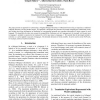Free Online Productivity Tools
i2Speak
i2Symbol
i2OCR
iTex2Img
iWeb2Print
iWeb2Shot
i2Type
iPdf2Split
iPdf2Merge
i2Bopomofo
i2Arabic
i2Style
i2Image
i2PDF
iLatex2Rtf
Sci2ools
LREC
2010
2010
English-Spanish Large Statistical Dictionary of Inflectional Forms
The paper presents an approach for constructing a weighted bilingual dictionary of inflectional forms using as input data a traditional bilingual dictionary, and not parallel corpora. An algorithm is developed that generates all possible morphological (inflectional) forms and weights them using information on distribution of corresponding grammar sets (grammar information) in large corpora for each language. The algorithm also takes into account the compatibility of grammar sets in a language pair; for example, verb in past tense in language L normally is expected to be translated by verb in past tense in Language L. We consider that the developed method is universal, i.e. can be applied to any pair of languages. The obtained dictionary is freely available. It can be used in several NLP tasks, for example, statistical machine translation.
| Added | 29 Oct 2010 |
| Updated | 29 Oct 2010 |
| Type | Conference |
| Year | 2010 |
| Where | LREC |
| Authors | Grigori Sidorov, Alberto Barrón-Cedeño, Paolo Rosso |
Comments (0)

